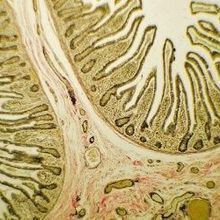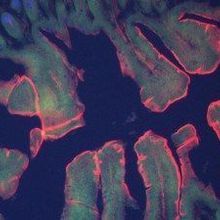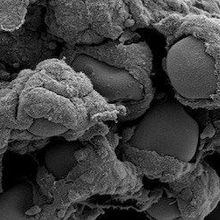Intestine

Bacterial Infections Disrupt Flies’ Sense of Smell
Abby Olena, PhD | Jul 21, 2021 | 4 min read
The temporary loss of olfaction stops the flies from eating any more of whatever it is that made them sick.

SARS-CoV-2 Antigens Leaking from Gut to Blood Might Trigger MIS-C
Alejandra Manjarrez, PhD | Jun 3, 2021 | 4 min read
Researchers find traces of SARS-CoV-2 in the stool and blood of kids with the post–COVID-19 inflammatory disorder, and signs of increased intestinal permeability.

Immunity to SARS-CoV-2 Lasts at Least Six Months, Data Show
Ashley Yeager | Nov 23, 2020 | 4 min read
Half a year after infection, people who had recovered from COVID-19 had robust antibodies, along with traces of the virus in their gut, which may drive long-lasting immunity.

Regulator of Mysterious Gut Antibodies Identified
Ruth Williams | Jul 31, 2020 | 3 min read
A B-cell receptor critical for the production of a subset of intestinal antibodies has been pinpointed, but the function of those antibodies remains unclear.

Image of the Day: Nutrient Sensor
Amy Schleunes | Mar 26, 2020 | 1 min read
A zinc-sensing protein found in fruit fly intestines regulates the insect’s growth and feeding behavior.

Image of the Day: Cryptosporidiosis Treatment
Emily Makowski | Nov 8, 2019 | 1 min read
An enzyme blocker is highly effective at treating intestinal parasitic infection in mice.

Image of the Day: Gut Response
Chia-Yi Hou | Jun 24, 2019 | 1 min read
Immune functions in the mouse intestine differ by segment.

Molecules Found in Ginger Remodel the Microbiome
Katarina Zimmer | Feb 1, 2019 | 3 min read
Small RNA-containing particles in ginger root are found to promote the growth of beneficial bacteria and alleviate colitis in mouse guts.

Image of the Day: Blood and Guts
Carolyn Wilke | Dec 13, 2018 | 1 min read
Researchers find that stem cells in the human intestine may provide up to 10 percent of circulating blood cells.

Image of the Day: Gut Feeling
Shawna Williams | Nov 28, 2018 | 1 min read
An unusual population of immune cells appears to exist in zebrafish as well as mammals.

Probiotics Prevent Cholera in Animal Models
Ruth Williams | Jun 13, 2018 | 4 min read
Two different types of bacteria—one genetically engineered and one from cheese—defend animal intestines from Vibrio cholerae infection.

Image of the Day: Fragile Fly
The Scientist and The Scientist Staff | Dec 7, 2017 | 1 min read
Researchers examine the effects on the fruit fly intestine of the protein responsible for Fragile X syndrome in humans.

Catalog of the Small Intestine Reveals New Cell Subtypes
Kerry Grens | Nov 8, 2017 | 2 min read
Single-cell analyses from mouse samples detail the changes in cell distribution during infections.

Gut Feeling
Ruth Williams | Jun 22, 2017 | 3 min read
Sensory cells of the mouse intestine let the brain know if certain compounds are present by speaking directly to gut neurons via serotonin.

Image of the Day: Imitation Intestines
The Scientist | Mar 12, 2017 | 1 min read
This 3-D model of human intestinal cells could help scientists develop new antimicrobial drugs and therapeutics.

Little-Known Gut Membrane Should Be Called a New Organ, Researchers Argue
Ben Andrew Henry | Jan 4, 2017 | 2 min read
A new anatomical view of the mesentery, which surrounds the lower abdomen, suggests that it should be considered the human body’s 79th organ.

Scientists Grow Intestinal Tissues With Functional Nerves In The Lab
Joshua A. Krisch | Nov 22, 2016 | 1 min read
Researchers are using the tissue, synthesized with human pluripotent stem cells and implanted into mice, to study a rare form of Hirschprung’s disease.

Looking for Loners
Karen Zusi | Dec 1, 2015 | 2 min read
A new algorithm opens doors for detecting rare cell types in mRNA sequencing.

Growing Human Guts in Mice
Jef Akst | Jan 12, 2015 | 1 min read
Researchers make more progress toward growing human intestines in mice, paving the way for better models of intestinal function and failure.
